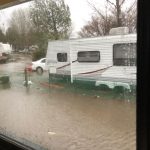Last Tuesday, Gov. Jerry Brown gave the California Department of Parks and Recreation several early Christmas gifts when he signed Assembly bills 1478 and 1589.
Most importantly, AB 1478 prohibits the governor or the Department of Parks and Recreation from closing, or even proposing the closure, of any state park this fiscal year or next year (2013-2014) and provides $30 million to improve the parks’ conditions.
Just a year ago, the governor was proposing and the Legislature was ready to shutter 70 state parks. To avert this action, many private organizations volunteered to help staff or to fund the operations at most of these parks.
This summer, people learned that the Department of Parks and Recreation had hidden $54 million of fees and other revenue and illegally paid annual leave for staff. This disclosure created an uproar resulting in the resignation of Ruth Coleman, state parks director. The reverberation may affect voters’ decisions about several propositions on the November ballot.
“Since news of the state parks scandal broke this summer, I have been working with legislative leaders and the Brown administration on the changes needed to restore public trust and confidence in California State Parks’ management and operations,” said Jared Huffman (AD 6-D), co-sponsor and author of the bills.
AB 1478 uses $10 million to match private donations to parks and local partner agreements during the next two years. Another $10 million was provided for maintenance of parks. Another $10 million is for bond funds for capital improvement projects to prevent park closures.
The second bill, AB 1589, requires the Department of Parks and Recreation to develop a plan to increase revenue collection at California’s state parks. Department of Parks and Recreation will examine the use of peak demand pricing at popular campgrounds, reassess whether appropriate fees are being used and additional mission-appropriate fees for service amenities such as expanding campground capacity at heavily used parks, upgrading overnight facilities and the possibility of increasing rental use of park facilities for special events.
The Legislature approved the use of $10 million of bond funds for the acquisition and installation of collection equipment and other improvements. An additional option would allow taxpayers to purchase voluntarily an annual state park access pass when filing taxes.
“AB 1589 gives the state important tools for a future that is increasingly emphasizing the need for more self-generated revenue in our parks,” said California State Parks Foundation President Elizabeth Goldstein. “While we do not believe that our state park system, a true public good, will ever be able to sustain itself without a core of dedicated, public funding, we do wholeheartedly agree that the movement toward more revenue generation should be done with a roadmap.”
Another Huffman bill, AB 2402, renames the Depart of Fish and Game as the Department of Fish and Wildlife. It establishes ecosystem-based management as a principal approach for the department. Decisions will rely on credible science that recognizes the full array of interactions within an ecosystem, including humans, rather than considering single issues, species, or ecosystem services in isolation, according to the bill.








